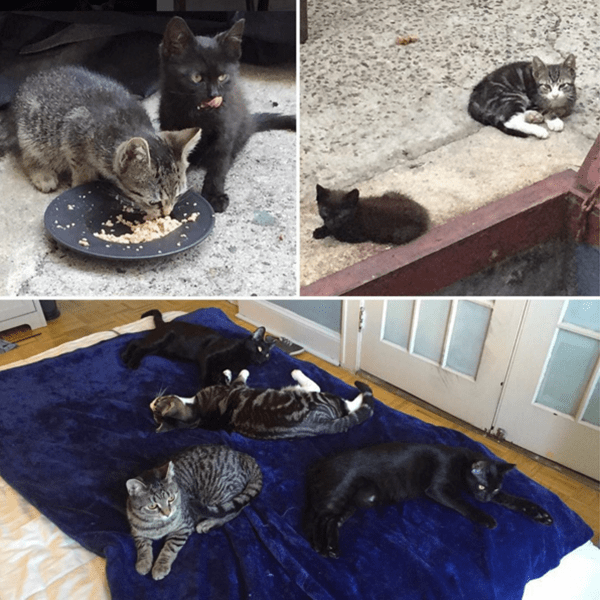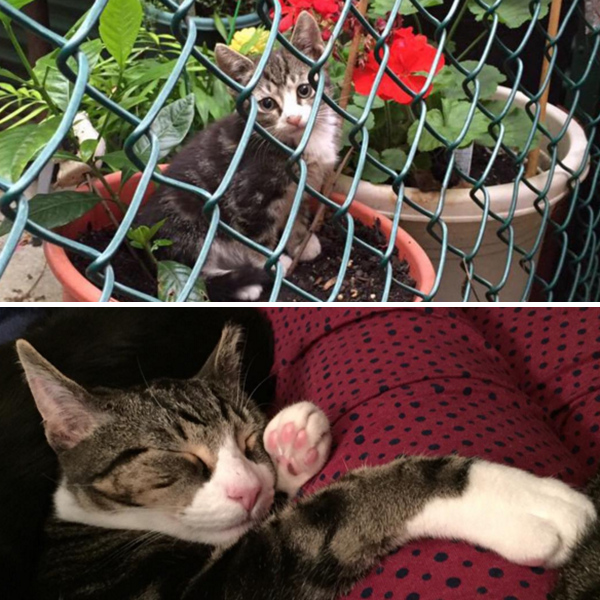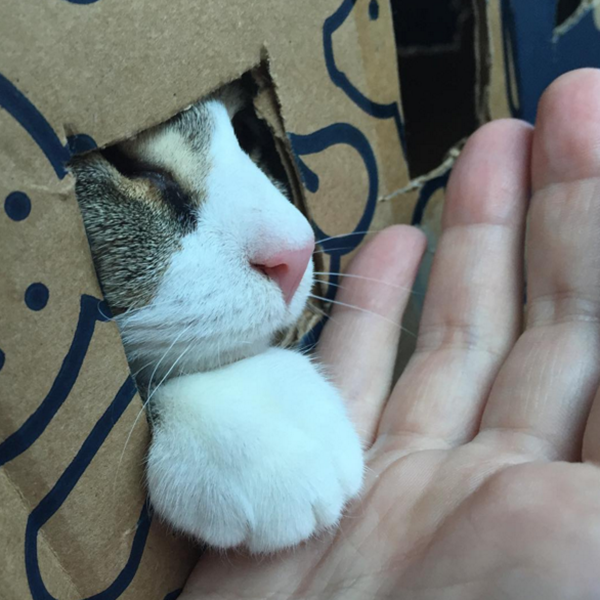This original essay, published here as an A+ exclusive, also appears in our new mini-book collaboration with everyone is gay, YES CATS!, which you should check out.
The Incredibly True Adventures of the Backyard Bobbis
One unbearably steamy summer Sunday in New York City, my girlfriend Stacy and I found five feral kittens in our backyard. They were terrified of us and bolted every time we opened the door — but they kept coming back. It took almost a week for us to understand that their mama was a feral cat we’d been feeding for a year, a black and white tuxedo we’d named Bobbi Jean. She came to the sound of our voice when we called out to her when we were walking down sidewalks or getting off the train, following at a distance and then waiting patiently outside our door while we prepared her food.
Bobbi Jean didn’t trust humans enough to let us touch her, or even stay near her while she ate, but she knew we’d never hurt her and that we were willing to share our food, so we decided she was counting on us to rescue her babies. We named all five of her kittens “The Bobbis.”
Over the course of the next month, we sat outside for hours with food, coaxing The Bobbis into eating in our presence at the same time every day. While we were doing that, I got Trap, Neuter, Return certified with the ASPCA and gathered the equipment I would need to trap them. We outfitted a room for the Bobbis with a big purple kitten den and a climbing castle and plenty of soft blankets.
We knew we didn’t have long to rescue them. Feral kittens have a very short window of time during which they can be socialized. They learn the way of the street so quickly. We also lost one of the kittens, Bobbi Jean Jr., to a car accident.

Finally, after a month of preparation, we were ready to trap the four Bobbis who’d made it through the impossible heat of the summer: Socks Bobbi, Dobby Bobbi, Beth March Bobbi, and Frodo Bobbi. The day after we trapped them, they visited the ASPCA, where they were spayed and neutered, vaccinated, and treated for fleas and ear mites. Then, they returned home with us.
Very, very, very slowly we earned their trust. They would eat in front of us, while we sat on the floor and looked in a different direction. They would eat with our hand on their food bowl. They would lick baby food — Gerber No. 2 chicken! — off of our fingers. They would let us stroke their backs, once or twice, as gentle as a whisper. We nudged them around their food bowl, lifted them quickly from one spot to another near their plate, coaxed them into our laps with tasty treats.
After weeks and weeks and weeks, all four of them finally let us pet them without food around. Then, they began to seek out affection from us. They crawled into our laps unprompted! They ran to us when we opened the door! They wanted to include us in their cuddle piles, and brought us stuffed toys so we could play their games too.
They got strong and they got big and their fur got silky and their eyes got bright and we fell in love with them.
And just when we were ready to start looking for forever homes for them, they got sick. Very sick. In one night, all four of them were admitted into an emergency hospital in New York City and diagnosed with feline panleukopenia, an often deadly virus that kills most kittens with 24 hours. The prognosis wasn’t good. Because FPV attacks quick-replicating cells like white blood and bone marrow, kittens the age of the Bobbis have a 70 percent mortality rate, even with with treatment. When the Bobbis first came to us, we knew it was likely they might never let us even touch them, but they’d learned to trust us completely, and the night we checked them into the hospital, they clung to us and cried for us and pressed their shaking faces into our hands when we reached into their carriers. We didn’t know if they’d live to see the morning.

They survived the night. And the next one. And the next one. On the fourth day of their treatment, the doctor told us that while they would normally want to keep infected cats in the hospital, our Bobbis were a special case. They needed to come home because sometimes the difference between life and death for kittens is knowing they’re fighting for someone they’re bonded to. And while feral kittens are often baffled by the human world, well into adulthood, our Bobbis understood completely that they were safe and loved when they were with us.
Their medical bills were super expensive, but our friends and family who had watched the Bobbis’ progress from terrified feral cats to cautious street cats to affectionate lap cats bonded together and raised almost $5,000 dollars for them. We gave twice-daily medicine for almost a month, monitored them every hour, and held them and loved them and begged them to keep on fighting. And then one day, the medicine was gone. And they’d made it. Not just one of them, but all of them.
Most people don’t get it. So much time and so much money spent on four sad little street cats. People think it’s a waste of time, of energy, of income, of life. They laugh. They ask why. Why? Why? Why?
I can’t speak for why other people do what they do, but I can speak for me, a person who has spent countless thousands of dollars saving animals in my lifetime (and been a beneficiary of the internet’s uncommon generosity when my beagle, Scout, was dying and needed very expensive life-saving surgery). Some people’s souls are sustained by art and some by reading and some by writing and some by church and some by food and a million other things. I have always been a person whose soul is sustained by my relationships with animals. They ease my anxiety, lessen the burden of my depression, focus my ADHD. Just being near them, taking care of them, loving and being loved by them.

My mother has borderline personality disorder among other things, including various addictive behaviors, and despite my superhuman efforts, I have never been able to make one bit of difference in her life. Trying to help her is like trying to fill up the Grand Canyon by throwing spoons full of water into it. That’s what it feels like to try change the world in any real way, to me.
It’s brutal and bleak and everything is so far out of our control, and really, truly, in the grand scheme of things, nothing we do matters on a global scale. Or a national one, really. Or a state one or a county one or a city one or even a neighborhood one. Sometimes, though, I get a chance to save an animal’s life. It doesn’t matter to the world at large. It doesn’t change the fact that the climate is out of control and America’s infrastructure is crumbling and the public school system is underfunded and diseases are ravaging less developed countries and wars are ravaging developed ones. But it matters to a kitten, and that matters to me.
I started saving animals when I was five years old, when I saw a mama cat get hit by a car and found her babies and hid them under my house. I snuck out to sleep with them at night, to keep them warm. I fed them my own food I smuggled away from the dinner table. And when my parents were yelling at each other and when my mom was slapping and screaming at me and when the kids at my school were making fun of me for being a cross-eyed dyke, I’d think about those kittens who were counting on me to keep them safe. I’d make it through another day.
The Bobbis’ mama, Bobbi Jean, comes to our back door every day for breakfast and dinner. She follows us home when we see her out and about. We saved her babies, like we promised her we would.
The world is burning, burning, burning. It has been as long as I’ve been alive. I can’t put out the fire, but maybe I can save one tiny life. Maybe I can save four. Maybe it only matters to me and the little guys I saved — and to their mama who will never know what it’s like to be scratched under the chin, or to fall asleep being petted in a lap by the fire — but that’s okay. The world is dark and light is precious. We all have to sustain our souls somehow.
Get YES CATS in the A+ store today for only $12 with discount code apluscats!







